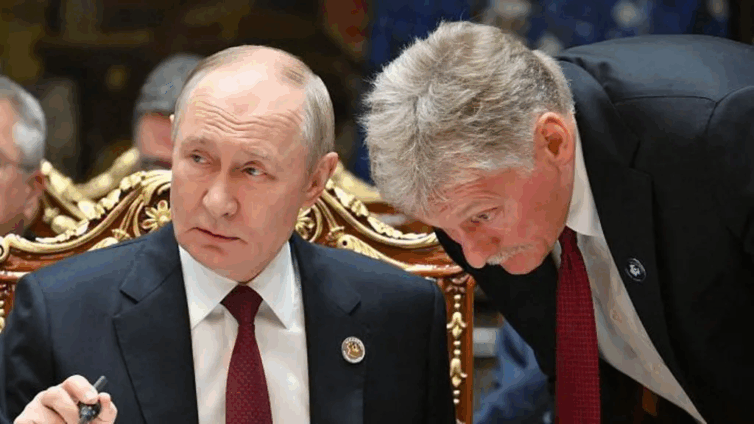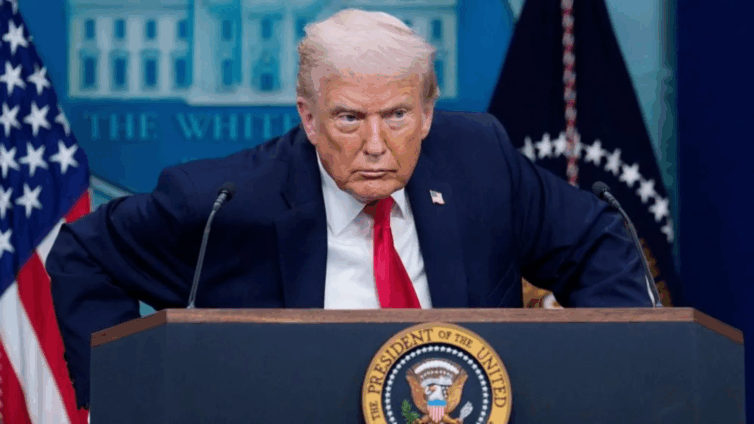Kremlin's Silence on Leaked Peace Plan Fuels International Tensions!

A new, multifaceted US-led peace initiative aimed at resolving the conflict in Ukraine has emerged, prompting a complex array of responses from Kyiv, Moscow, and international partners. Despite the contentious nature of some proposals within the leaked draft, Ukrainian President Volodymr Zelensky has indicated a readiness to engage with the "vision" presented by the Trump administration to bring an end to the prolonged war. Concurrently, Russia, while officially stating it has not received any formal communication regarding the plan, maintains its openness to peace talks, albeit on its own established terms.
The widely circulated 28-point US plan contains several provisions that Kyiv had previously rejected, notably the ceding of areas in the eastern Donetsk region still under Ukrainian control, a reduction in the size of Ukraine's armed forces, and a pledge by Ukraine not to join NATO. These stipulations are largely perceived as heavily slanted in Moscow's favor, eliciting a carefully worded but non-committal response from Zelensky's office. The White House has attempted to counter claims that Ukraine was excluded from the drafting process, citing discussions between US special envoy Steve Witkoff and Rustem Umerov, a senior member of Zelensky's administration, who reportedly agreed to a majority of the plan's elements after making several modifications. However, Umerov later posted on Telegram that he had not provided any assessments or approvals, emphasizing that Ukraine was still "carefully considering our partners' proposals."
President Zelensky has notably refrained from public criticism or outright rejection of the plan, stating he "appreciated the efforts of President Trump and his team to return security to Europe." This diplomatic approach might be aimed at keeping the US president engaged, despite his administration's perceived softer stance towards Russia. Zelensky's office suggested the plan "in the American side's assessment, could help reinvigorate diplomacy," and he anticipates discussing the proposals directly with Donald Trump in the coming days. On the other hand, Kremlin spokesperson Dmitri Peskov confirmed Moscow had not received anything official, remarking, "We are seeing some new elements, but officially we haven't received anything. There has been no substantive discussion of those points," while reiterating Russia's "complete open[ness] to peace talks." Russia has consistently demanded that any peace deal must address the "root causes of the conflict," a phrase commonly understood as a shorthand for its maximalist demands that Ukraine views as tantamount to surrender.
This diplomatic maneuver unfolds amidst relentless Russian military activity, with six people killed in overnight strikes across the southern Zaporizhzhia and eastern Dnipropetrovsk regions. Russia continues to claim small territorial gains in eastern Ukraine and currently controls approximately 20% of the country's territory, albeit reportedly at the cost of huge combat casualties. Domestically, Zelensky is grappling with a corruption scandal involving top officials. Meanwhile, former President Trump has expressed increasing frustration with negotiations with Moscow, leading to the imposition of fresh sanctions on Russia's two largest oil producers. On the day the US delegation was in Kyiv, Russian President Putin was seen in military fatigues, discussing continued fighting with his army chiefs, declaring, "We have our tasks, our goals. The chief one is the unconditional achievement of the aims of the special military operation."
International reactions to the draft plan highlight a cautious approach. European allies, including EU foreign policy chief Kaja Kallas and German Foreign Minister Johann Wadephul, have stressed the indispensable need for Ukrainian and European involvement for any peace plan to be viable. Kallas stated, "For any plan to work, it needs Ukrainians and Europeans onboard," while Wadephul described the draft document as a "list of topics and options" rather than a fully fledged proposal. British Prime Minister Sir Keir Starmer, French President Emmanuel Macron, and German Chancellor Friedrich Merz have reportedly discussed the plan with Zelensky, indicating broader European engagement. Public sentiment within Ukraine, however, reveals deep apprehension. A Ukrainian soldier's widow stated, "This is not a peace plan, it is a plan to continue the war," while a person from an occupied territory expressed hope that the plan would not be signed, fearing abandonment.
Further specifics of the leaked draft include proposals to limit Ukraine's military to 600,000 personnel, station European fighter jets in neighboring Poland, and for Ukraine to forgo many of its existing weapons. In return, Kyiv would supposedly receive "reliable security guarantees," though no concrete details have been provided. The document also "expects" that Russia will not invade its neighbors and that NATO will not expand further. A particularly significant and controversial element suggests Russia's "reintegration into the global economy" through the lifting of sanctions and an invitation for Russia to rejoin the G7, effectively restoring the G8.
Despite the official denial of receiving the US plan, pro-Kremlin commentators and state media have actively discussed the leaked proposals. The Izvestia newspaper interpreted President Putin's visit to a command post as "a signal to America that he's prepared to negotiate on Ukraine, on Russia's terms." Dmitry Peskov has advised Kyiv to agree terms, asserting that "The Russian military's effective work should convince Zelensky and his regime that it's better to strike a deal and do it now." Pro-Kremlin voices insist Russia will prevail regardless of a peace deal, suggesting that the "balance of power is shifting in Russia's favour." However, Russia is also under considerable pressure; after nearly four years of war, its army has suffered significant losses, its economy is faltering, with a growing budget deficit, falling oil and gas revenues, and an industry described as "somewhere between stagnation and decline."
Intriguingly, certain elements of the peace plan have not been universally welcomed within Russia. Reports suggest that Ukraine could be offered security guarantees modeled on NATO's Article 5, which would commit Western allies to treat any future Russian attack on Ukraine as an attack on the transatlantic community, potentially triggering a combined military response. Some Russian commentators, like Moskovsky Komsomolets, view this as "Ukraine in Nato," albeit "without the deployment of bases and weapons on its territory." The full details of this complex peace plan remain unconfirmed, suggesting the onset of another period of intense diplomacy. Nevertheless, the war in Ukraine continues unabated, underscoring the formidable challenges in achieving a resolution acceptable to all parties.
You may also like...
Bundesliga's New Nigerian Star Shines: Ogundu's Explosive Augsburg Debut!

Nigerian players experienced a weekend of mixed results in the German Bundesliga's 23rd match day. Uchenna Ogundu enjoye...
Capello Unleashes Juventus' Secret Weapon Against Osimhen in UCL Showdown!

Juventus faces an uphill battle against Galatasaray in the UEFA Champions League Round of 16 second leg, needing to over...
Berlinale Shocker: 'Yellow Letters' Takes Golden Bear, 'AnyMart' Director Debuts!

The Berlin Film Festival honored
Shocking Trend: Sudan's 'Lion Cubs' – Child Soldiers Going Viral on TikTok

A joint investigation reveals that child soldiers, dubbed 'lion cubs,' have become viral sensations on TikTok and other ...
Gregory Maqoma's 'Genesis': A Powerful Artistic Call for Healing in South Africa

Gregory Maqoma's new dance-opera, "Genesis: The Beginning and End of Time," has premiered in Cape Town, offering a capti...
Massive Rivian 2026.03 Update Boosts R1 Performance and Utility!

Rivian's latest software update, 2026.03, brings substantial enhancements to its R1S SUV and R1T pickup, broadening perf...
Bitcoin's Dire 29% Drop: VanEck Signals Seller Exhaustion Amid Market Carnage!

Bitcoin has suffered a sharp 29% price drop, but a VanEck report suggests seller exhaustion and a potential market botto...
Crypto Titans Shake-Up: Ripple & Deutsche Bank Partner, XRP Dips, CZ's UAE Bitcoin Mining Role Revealed!

Deutsche Bank is set to adopt Ripple's technology for faster, cheaper cross-border payments, marking a significant insti...





